With Betsy DeVos confirmed as President Trump’s Secretary of Education, it may seem that Republicans in Congress and in statehouses will quickly enact school choice policies. However, the scope of change may be more limited than many expect. Recently, we looked at the Medicaid expansion component of the Affordable Care Act, discussing how the interests of Republican governors have put some of them at odds with a segment of their congressional counterparts, creating political divisions that could complicate repeal efforts. School choice policies are similar to Medicaid in that states play a large role in implementation, and recent developments have indicated important potential rifts within the Republican Party at both the state and federal levels.
School choice issues—which include both charter schools and voucher programs—were front and center on Capitol Hill recently as the Senate considered the nomination of Betsy DeVos for Secretary of Education. The Senate confirmed DeVos last week, but not before Democrats engineered an all-night talk-a-thon against her nomination and two Republican senators defected, requiring an unprecedented tie-breaking vote from Vice President Mike Pence. This drama on the floor of the chamber accompanied significant off-the-floor activity as well, with senators noting extremely high levels of constituent contact opposing the nomination. Senator Lisa Murkowski (R-Alaska), who broke party lines to vote against DeVos, reported that numerous calls from concerned constituents influenced her decision to vote no, and other senators described high levels of constituent contact as well. The nomination was also the subject of protests in cities like Denver and Cleveland, reflecting a largely unprecedented level of popular opposition to a Secretary of Education nominee.
Much of the resistance to DeVos was centered on school choice and charter school issues, in part because much of her education-related reputation was built on her advocacy and philanthropy in that area in her home state of Michigan. Unlike public opinion on many issues, including the Affordable Care Act, the politics of these issues do not tend to fall neatly along party lines. As our Brookings colleague Jon Valant recently discussed, charter schools are more popular with Republican voters than with Democratic ones, though majorities of both parties support them. On vouchers, meanwhile, Democratic respondents—somewhat puzzlingly—are more supportive than Republicans, with the policy becoming less popular among both groups in recent years.
The reaction to the DeVos nomination suggests that an important part of public opinion on choice issues may be connected to geography, rather than to partisanship alone. Consider, for example, that the two Republican senators who voted against DeVos; Murkowski and Senator Susan Collins (R-ME) hail from rural states, where school choice options such as charters and vouchers are typically not considered feasible alternatives to underperforming schools, given the low population density. Even those who voted for her, such as Senator Mike Enzi (R-WY), inquired during her confirmation hearing what a school choice approach would mean for their constituents. Perhaps validating this skepticism, research suggests that while charter schools in urban areas tend to out-perform traditional public schools, charter schools outside urban areas “do no better and sometimes do worse than public schools.”
These geographic patterns, moreover, may have important consequences for Republican efforts to reshape education policy even in the face of unified Republican control at the federal level. In Congress, major legislation is unlikely. Republicans are traditionally champions of state and local control when it comes to education, and this has never been truer than now. The new federal education law passed in 2015, the Every Student Succeeds Act (ESSA), rolled back the federal role in education in a reversal from the No Child Left Behind era. In the year since the law passed, congressional Republicans have sought to restrict what they characterize as federal overreach by the Obama administration. Just last week, the House passed a resolution to revoke an ESSA regulation finalized in November.
With this Republican-led trend in rolling back federal education authority not likely to reverse any time soon, it seems unlikely that either chamber will embrace a sweeping federal law that mandates state-level policy change. The $20 billion dollar school voucher program that President Trump proposed on the campaign trail and similar school-choice oriented bills that would convert federal aid into individual scholarships may seem attractive to Republicans eager to remove federal strings from federal education dollars, but it seems unlikely that such a proposal would garner sufficient support in the Senate.
But let’s briefly consider the possibility that such a bill would gain some traction, particularly with such a prominent school choice advocate as Secretary of Education. Given the dynamics within the Republican Party when it comes to school choice, members of Congress representing rural districts or largely rural states would be hard-pressed to make the case for this type of federal intervention. As DeVos’s 50-50 confirmation vote illustrates and political scientist Mona Vakilifathi recently argued, there are no guarantees that the Republican leadership could count on solid support from their rank-and-file members—and the moderate Democrats most likely to vote with Republicans hail from rural states and are unlikely to cross party lines on this issue.
Just as Republicans in Congress may resist school choice policies that may be a bad fit for rural communities, we are likely to see similar pushback from state-level Republicans who represent rural voters. In states with large rural populations, we may not see the forward momentum for school choice policies that DeVos’s confirmation seems to suggest at first glance. True, with unified Republican control of government in 24 states, we are likely entering a particularly active period of conservative law making at the state level.
However, in states like Kentucky, one of only seven states without charter schools, we should not assume that unified Republican control means quick and easy passage of charter legislation. Indeed, Ryland Barton reports that “when it comes to charter schools, Republicans might be divided on one issue: whether to allow charters in all 120 counties in Kentucky, or just the two biggest—and urban—ones.” The recent defeat of Proposition 2 in Massachusetts, which would have raised the state’s cap on charter schools, illustrates opposition to charter schools among suburban voters as well. Indeed, even though Proposition 2 would have had “little or no effect on their own schools,” many suburban voters recoiled at the remote possibility of charter schools opening in their districts.
Another factor to consider is whether opposition from teachers’ unions may slow the pace of school choice legislation within states. Unions generally oppose charter schools and vouchers, and at the same time, they are stalwart Democratic supporters (and donors). Even for Republican governors whose own constituencies favor school choice reforms, union opposition could create roadblocks, as the defeat of Proposition 2 in Massachusetts illustrated (Republican Governor Charlie Baker supported the ballot measure, while unions spent heavily to defeat it). However, in states with right to work laws that affect teachers’ unions, Republican governors may face less powerful opposition to their preferred school choice reforms.
Given the divisive nature of school choice policies, particularly for Republican governors in rural states as well as those who answer to powerful suburban constituencies and/or face opposition from strong unions, we might expect that governors seeking re-election in 2018 aim to avoid conflict over this issue. With no shortage of issues to advance that play well to their base, such as cutting taxes, passing right to work laws, and restricting abortion rights, why risk becoming mired in an intra-party (not to mention inter-party) fight over school choice? We might expect movement on this issue in states like Missouri, with a newly elected Republican governor presiding over unified Republican government. But it seems unlikely that Republican governors in rural states like Maine or New Mexico (which scores 16th out of 18 on the National Alliance for Public Charter Schools “Health of the Movement” index) are going to champion charters and vouchers.
Since the 2016 elections, much has been made of the potential policy consequences of unified Republican governing majorities at both the state and federal levels and indeed, major changes in a number of areas are likely. On others, there are important divisions with the Republican Party based on geography. These splits will be reflected in disagreements across all levels of government on some issues, like the ACA, and within levels on others, like school choice policy. In both cases, the effect may be less action in Congress and more policy diversity across states compared to other issues, like tax cuts, right to work, and abortion access.
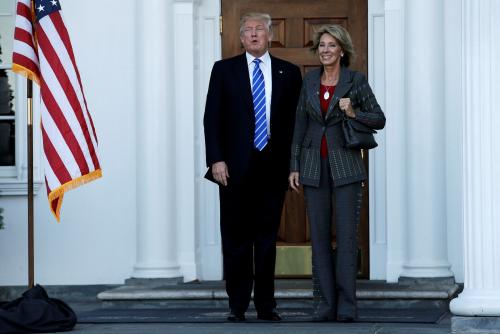
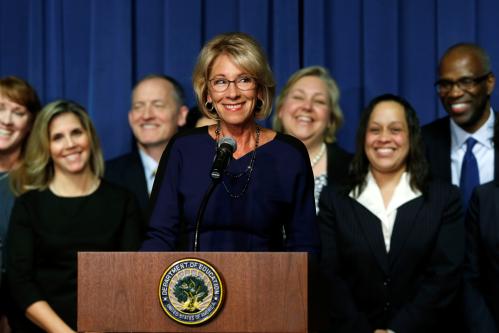
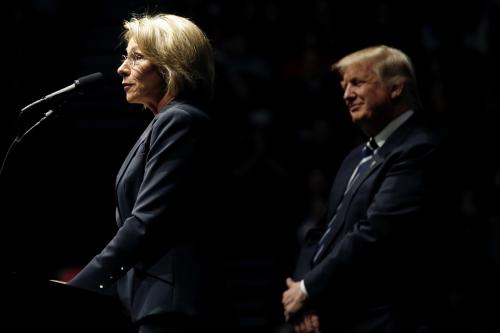

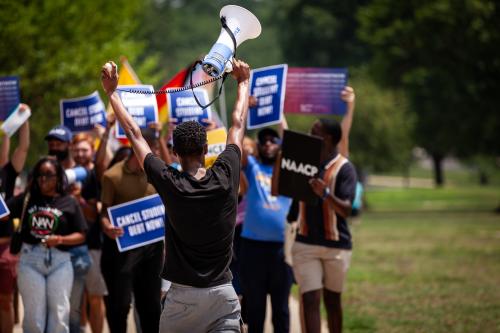
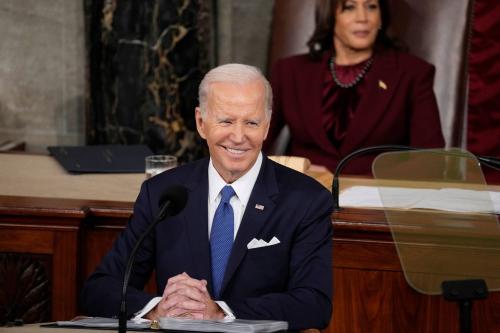
Commentary
Rifts among congressional, state Republicans over school choice
February 21, 2017